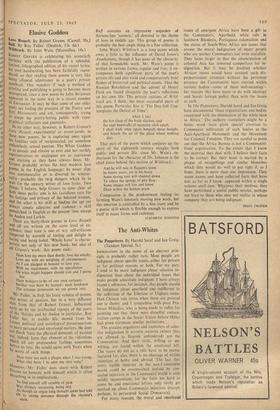The Anti-Whites
The Puppeteers. By Harold Soref and Ian Greig.
(Tandem Special, 5s.) •
INDIGNATION in the name of an abstract prin- ciple is probably rather rare. Most people are indignant about specific issues, either for private or for political reasons or both. For my part, I tend to be more indignant about selective in- dignation than about the individual issues that make people selectively indignant. I have always found it offensive, for instance, that people should be indignant about apartheid and indifferent to the sufferings of the Tibetans or Uighurs under Hari Chinese rule (even when these are pointed out to them); and I sympathise with poor Pro- fessor Mihajlov, who is being made to suffer for pointing out that there were dreadful concen- tration camps in the Soviet Union before Hitler had given Germany similar institutions.
The greatest organisers and exploiters of selec- tive indignation in western societies (where they are allowed to flourish unhindered) are the Communists. And their tools, willing or un- witting, are found within the emotional left. The issues do not as a rule have to be manu- factured for, alas, there is no shortage of visible injustices at home and abroad. The fact that every visible injustice in the non-Communist world could be overmatched tenfold by con- cealed injustices in the Communist world is only mildly inconvenient, for the fads are hard to come by and emotional leftists only rarely get worked up about Communist injustices (except, perhaps, to persecuted Social Democrats). For many reasons, the moral and emotional issues of emergent Africa have been a gift to the Communists. Apartheid, white rule in Southern Rhodesia, Portuguese colonialism and the status of South-West Africa are issues that arouse the moral indignation of many people who are neither Communists nor even socialists. They loom larger in that the emancipation of colonial Asia has removed competitors for in- dignation. But it may be doubted whether African issues would have aroused such dis- proportionate attention without the persistent pressure the Communists have exerted within various bodies—some of them well-meaning— for reasons that have more to do with ideology and Soviet foreign policy than with the issues as such.
In The Puppeteers, Harold Soref and Ian Greig have documented 'those organisations and bodies concerned with the elimination of the white man in Africa.' The authors—compilers might be a better word—have given special attention to Communist infiltration of such bodies as the Anti-Apartheid Movement and the Movement for Colonial Freedom. They are careful to point out that the Africa Bureau is not a Communist- front organisation. To the extent that I know the material they deal with, I believe their facts to be correct. But their book 'is marred by a plague of misspellings and similar blemishes which they would do well to put right if, as I hope, there is more than one impression. They name names and have collected facts that have not, as far as I know, appeared within a single volume until now. Whatever their motives, they have performed a useful public service, perhaps not least to those who may not realise in whose company they are being indignant.
BRIAN CROZIER














































 Previous page
Previous page